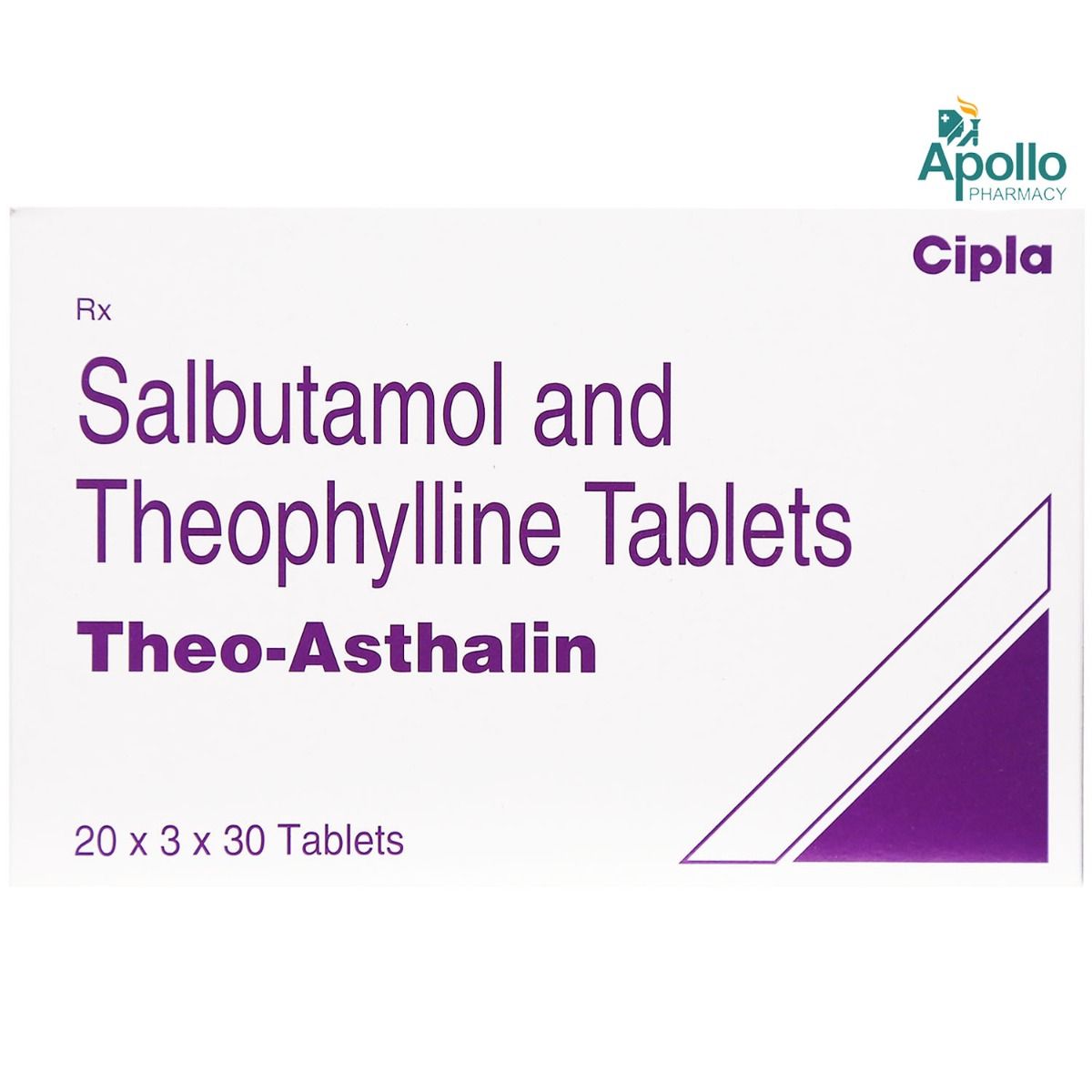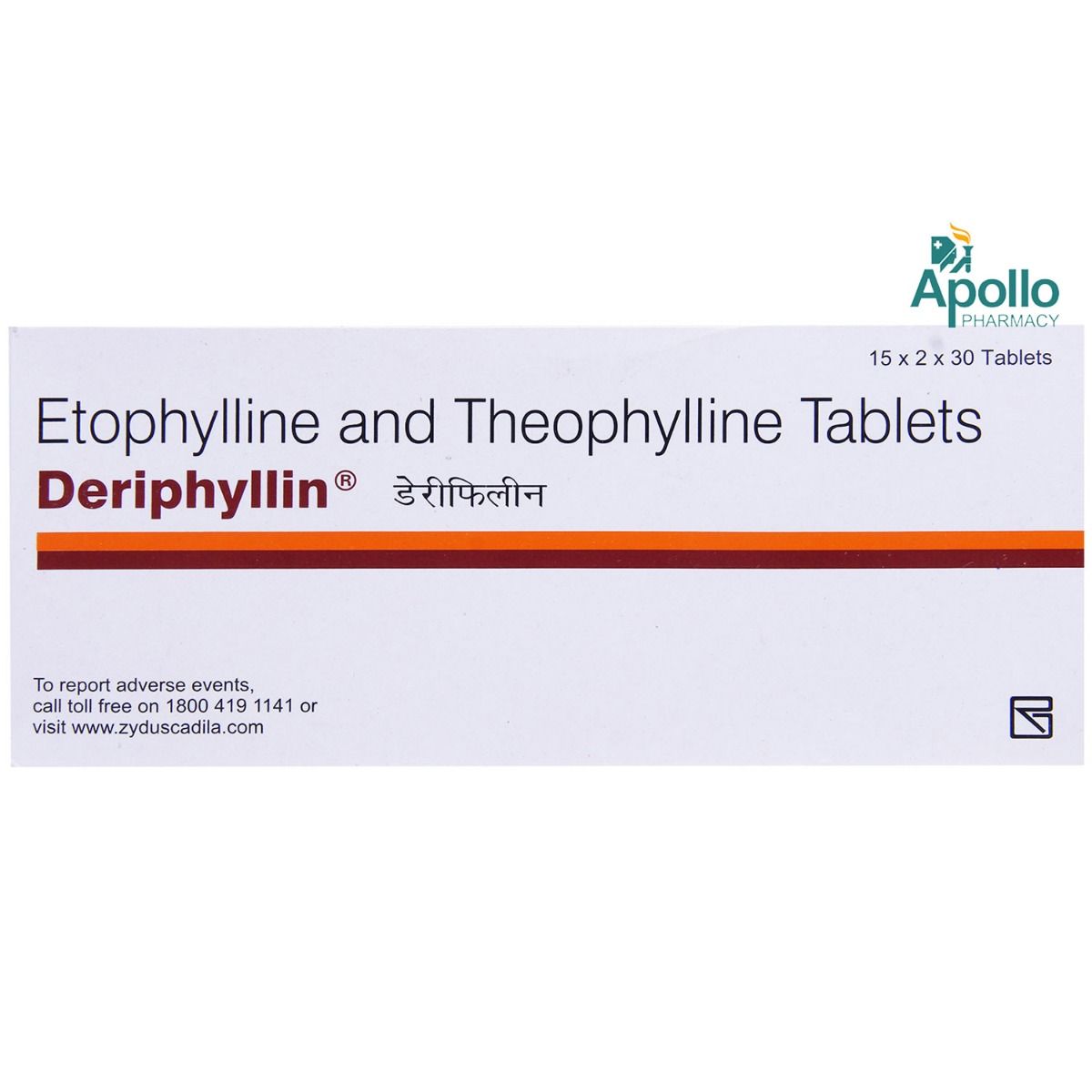About THEOPHYLLINE+ETOPHYLLINE
THEOPHYLLINE+ETOPHYLLINE belongs to the class of drugs called bronchodilators used to prevent and treat symptoms of asthma and chronic obstructive pulmonary disease (COPD). Asthma is a chronic (long-term) respiratory condition in which airways narrow, swell, and produce extra mucus, leading to difficulty breathing. COPD is a group of lung diseases with emphysema (shortness of breath) and chronic bronchitis (inflammation of the lining of bronchial tubes).
THEOPHYLLINE+ETOPHYLLINE contains Theophylline and Etophylline, which work by relaxing muscles and widening the airways of the lungs. Thus, it makes breathing easier.
Take THEOPHYLLINE+ETOPHYLLINE as prescribed. You are advised to take THEOPHYLLINE+ETOPHYLLINE for as long as your doctor has recommended it based on your medical condition. Sometimes, you may experience nausea, vomiting, headache, restlessness, dizziness, irregular heartbeat, or stomach upset. Most of these side effects of THEOPHYLLINE+ETOPHYLLINE do not require medical attention and gradually resolve over time. However, if the side effects persist or worsen, please consult your doctor.
If you are allergic to THEOPHYLLINE+ETOPHYLLINE or any other medicines, please tell your doctor. If you are pregnant or breastfeeding, it is advised to inform your doctor before using THEOPHYLLINE+ETOPHYLLINE. Do not take THEOPHYLLINE+ETOPHYLLINE if you have a heart rhythm disorder. If your breathing worsens or you often wake up at night with asthma and experience chest tightness in the morning, please consult a doctor immediately as these might be signs indicating that your asthma is not controlled properly and requires an alternate or additional treatment.
Uses of THEOPHYLLINE+ETOPHYLLINE
Asthma, Chronic obstructive pulmonary disease (COPD)
Medicinal Benefits
THEOPHYLLINE+ETOPHYLLINE contains two bronchodilators namely, Theophylline and Etophylline used to treat symptoms of asthma and chronic obstructive pulmonary diseases (COPD). THEOPHYLLINE+ETOPHYLLINE works by relaxing muscles and widening the airways of the lungs. Thus, it makes breathing easier.
Directions for Use
Storage
Side Effects of THEOPHYLLINE+ETOPHYLLINE
- Nausea
- Vomiting
- Headache
- Restlessness
- Dizziness
- Irregular heartbeat
- Stomach upset
In-Depth Precautions and Warning
Drug Warnings
If you are allergic to THEOPHYLLINE+ETOPHYLLINE or any other medicines, please tell your doctor. If your breathing worsens or you often wake up at night with asthma, and experience chest tightness in the morning, please consult a doctor immediately as these might be signs indicating that your asthma is not controlled properly and requires an alternate or additional treatment. Regular monitoring of potassium levels is recommended while taking THEOPHYLLINE+ETOPHYLLINE as it may cause low potassium levels in the blood. If you are pregnant or breastfeeding, it is advised to inform your doctor before using THEOPHYLLINE+ETOPHYLLINE. Do not take THEOPHYLLINE+ETOPHYLLINE if you have a heart rhythm disorder. Avoid taking THEOPHYLLINE+ETOPHYLLINE if you have a history of a heart attack.
Drug Interactions
Drug-Drug Interaction: THEOPHYLLINE+ETOPHYLLINE may interact with antidepressants (clomipramine, desipramine, amitriptyline, amoxapine), anti-HIV medicines (ritonavir), antibiotics (erythromycin, clarithromycin, ciprofloxacin, enoxacin, linezolid), antifungals (fluconazole), anti-tuberculosis drugs (isoniazid, rifampicin), diuretics and oral contraceptives.
Drug-Food Interaction: THEOPHYLLINE+ETOPHYLLINE may interact with caffeine. Therefore, avoid or limit the intake of caffeine with THEOPHYLLINE+ETOPHYLLINE as it may increase side effects. THEOPHYLLINE+ETOPHYLLINE may interact with St. John's wort (a herbal supplement). Therefore, inform your doctor if you are using St. John's wort before taking THEOPHYLLINE+ETOPHYLLINE.
Drug-Disease Interaction: If you have kidney, liver or heart problems, inform your doctor before taking THEOPHYLLINE+ETOPHYLLINE.
Drug-Drug Interactions Checker List:
Safety Advice

Alcohol
cautionThe interaction of THEOPHYLLINE+ETOPHYLLINE with alcohol is unknown. Please consult a doctor before consuming alcohol while using THEOPHYLLINE+ETOPHYLLINE.

Pregnancy
cautionPlease consult a doctor if you are pregnant. THEOPHYLLINE+ETOPHYLLINE is given to pregnant women only if the doctor thinks the benefits outweigh the risks.

Breast Feeding
cautionIt is unknown whether THEOPHYLLINE+ETOPHYLLINE is excreted in human milk. THEOPHYLLINE+ETOPHYLLINE is given to breastfeeding mothers only if the doctor thinks the benefits are greater than the risks.

Driving
cautionDrive only if you are alert after taking THEOPHYLLINE+ETOPHYLLINE as it may cause dizziness in some people.

Liver
cautionTake THEOPHYLLINE+ETOPHYLLINE with caution, especially if you have a history of Liver diseases/conditions. The dose may be adjusted by your doctor as required. Avoid taking THEOPHYLLINE+ETOPHYLLINE if you have severe liver disease.

Kidney
cautionTake THEOPHYLLINE+ETOPHYLLINE with caution, especially if you have a history of Kidney diseases/conditions. The dose may be adjusted by your doctor as required. Avoid taking THEOPHYLLINE+ETOPHYLLINE if you have severe kidney disease.

Children
cautionPlease consult a doctor if you have any concerns regarding the usage of THEOPHYLLINE+ETOPHYLLINE in children.
Habit Forming
Diet & Lifestyle Advise
- Eat foods rich in potassium such as tomatoes, bananas, asparagus, oranges, potatoes, avocados, dark leafy greens and beetroots as potassium is important for lung function and a deficiency in potassium may cause breathing problems.
- Drink plenty of fluids every day to thin mucus which makes it easier to cough out.
- Avoid foods such as cabbage, beans, garlic, onions, shrimp, pickled food, dried fruits, fried foods, carbonated drinks, wine, bottled lemon and lime juice as it may worsen asthma symptoms.
- Exercise regularly to strengthen your breathing muscles and boost your immune system. Learning breathing exercises will help you move more air in and out of your lungs.
- Do meditation, deep breathing, regular exercise and try progressive muscle relaxation techniques to get relief from stress and reduce the risk of an asthma attack.
- Quit smoking as it may reduce the effectiveness of THEOPHYLLINE+ETOPHYLLINE, irritate the lungs or worsen breathing problems.
Patients Concern
Disease/Condition Glossary
Asthma: It is a chronic (long-term) respiratory condition in which airways narrow, swell, and produce extra mucus, leading to difficulty in breathing. The symptoms of asthma include wheezing (whistling sound while breathing), shortness of breath, chest tightness, and cough, especially at night. The treatment for asthma includes medication, breathing exercises, and self-care.
Chronic obstructive pulmonary disease (COPD): It is a group of lung diseases with emphysema (shortness of breath) and chronic bronchitis (inflammation of the lining of bronchial tubes). The major cause of COPD is smoking tobacco. Also, long-term exposure to fumes and chemicals may lead to COPD. The symptoms include chronic cough, shortness of breath, or wheezing (whistle sound while breathing).



